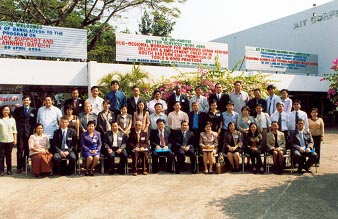
At the opening ceremony, seated from left, Ms. Phantumvanit Pongsri, Deputy Director, ILO Bangkok, Mr. Peera Manatat, Vice Minister of Ministry of Labour, Thailand, and Prof. Mario T. Tabucanon, Provost, AIT. At the podium is Mr. Valter Neuloni, Activity Manager, ILO/ITC, Turin.
UMP-AIT Partnership and International Labour Organization
The UMP (Urban Management Program) - AIT Partnership and International Labour Organization (ILO) jointly organized a sub-regional workshop for improved urban service delivery and employment creation in South-East Asia workshop, 'Better Services, More Jobs' on March 8-10, 2004.
The objective of the workshop was to enhance the participants' knowledge and ability to plan, design and implement development initiatives geared to create decent and sustainable jobs while providing improved infrastructure and services for poor people living in cities.
In the workshop, the opening remarks and welcome address were given by Ms. Phantumvanit Pongsri, Deputy Director, ILO Bangkok; Prof. Mario T. Tabucanon, Provost, AIT and Mr. Peera Manatat, Vice Minister of Ministry of Labour, Thailand.

Workshop participants pose for a souvenir photo
Twenty-eight participants from seven countries : Cambodia, Indonesia, Laos, Papua New Guinea, Philippines, Thailand, Vietnam, discussed for three days a number of concepts, strategies, practical approaches and validated tools in what became a highly interactive event. They concluded with the presentation of concrete action plans to be taken further in their respective countries. The action proposals demonstrate the improved understanding and high commitment to reduce poverty through job creation and improving basic services. All action programmes show the intention to set up and strengthen partnerships between local authorities and stakeholders representing communities, people working in the informal economy, and support organizations.
The workshop was enriched by relevant and well-prepared case studies from UMP-Asia partners or those working with ILO, as well as by other organizations. These showed the similarity of the objectives as well as the complementarity of the respective strategies towards improved local governance and more opportunities for employment creation and social inclusion.
